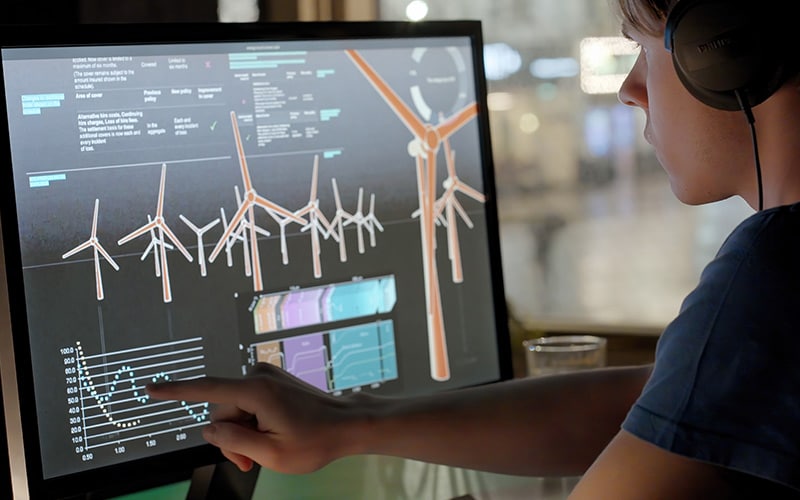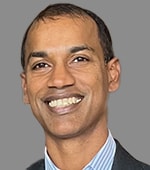
-
How AI is Transforming the Energy Sector with Joseph Alenchery
August 27, 2024
Insights
- AI as a Catalyst for Energy Transition: AI is crucial in optimizing energy generation, improving efficiency, and driving sustainability in the energy sector. By analyzing vast amounts of data, AI can make intelligent decisions that reduce energy usage and enhance resource management, making it a vital tool for achieving net-zero goals.
- The Power of AI-Based Platforms: Digital platforms powered by AI enable companies to scale their energy management efforts. Infosys' Energy as a Service platform, which integrates solar generation, demand forecasting, and cost optimization, showcases how AI platforms can deliver significant improvements in energy efficiency and sustainability at an enterprise level.

Jeff Kavanaugh: I am Jeff Kavanaugh with the Infosys Knowledge Institute. The energy sector is undergoing a significant transformation driven by advancements in AI technology. These changes are enhancing efficiency, optimizing resource management, and driving sustainability initiatives. The implications of these advancements are far-reaching, affecting everything from operational costs to environmental impact. This discussion explores the impact of AI platforms on the energy sector and how they're shaping the future energy management and sustainability. I'm here with Joseph Alenchery, senior leader of the Infosys Energy Unit to discuss AI platforms and energy. Welcome Joseph.

Joseph Alenchery: Thank you, Jeff. Thank you for having me. Look forward to our discussion.

Jeff Kavanaugh: Absolutely. Well, let's jump in. Energy transition, what does it mean to you and where are things today?

Joseph Alenchery: Well, Jeff, the clamor for energy transition is deafening. We've seen corporations around the world promise itself to a net zero future. We've seen government acting on it. I think the topic of energy transition has become mainstream. The need to move towards the cleaner, greener future is today accepted and understood and there are various forces acting for it. The really important part is, there are different emerging aspects of this, whether it be carbon capture, better ways of energy management, hydrogen as an alternate fuel, electrification, of course, solar, wind, and hydro. There are so many vectors, so many forces of technology and engineering that are emerging in this area, that it's important for us to look at how do we harness all of this together to support the global ecosystem towards a net zero future. I think AI has a very, very big part to play in this. I think that's going to be the defining technology that's going to make the maximum impact towards a net zero future.

Jeff Kavanaugh: That's a good segue, Joseph. You get this basket of emerging technologies, everything from IoT, advanced computing power, which is off the charts now, you've got all these connections, integrations. What is it about AI and why now?

Joseph Alenchery: Today, there's more data, millions of data points emerging, more data than ever before. And how do you harness all this data and come up with intelligent decisions, whether it be related to energy generation, whether it be related to energy usage and efficiency. That's going to be a big lever towards reducing energy usage, improving generation, overall efficiency.

Jeff Kavanaugh: Let's talk about the other side of energy, because AI does consume a lot of energy. So how do you balance that?

Joseph Alenchery: Yeah, it's a million-dollar question, Jeff. AI does use a lot of computing power. It does generate energy, but I'm just looking at it from a cost-benefit perspective for the energy that it uses, the energy consumption that it reduces, and the contribution towards the better generation. That far outweighs the benefits, far outweigh the cost of AI. We don't look at AI just in terms of efficiency and generation. We've got to look at AI in terms of optimized decision-making, throwing up new ways of working, completely changing the way some of these engineering platforms have been used. And that brings me to the point of AI-based platforms, and I think it's going to be digital platforms that's going to be the foundation of what we are trying to do here. We, at Infosys, have many examples of that, which I'll talk to subsequently.

Jeff Kavanaugh: One follows up, Joseph. It's interesting because this idea of platforms as companies move to an operating model that is trying to keep up with all these advancements with lots of small teams, it's almost like you need a platform to scale. What does it mean to have an AI-based platform?

Joseph Alenchery: Jeff, I think you hit the nail on the head to have enterprise scale, to have global scale you need digital platforms so that it can be used, reused and it can be fine-tuned. We have a great story within Infosys. In fact, it'll be interesting to note, Infosys is the first technology services company in the world to be carbon neutral, in 2020, 30 years ahead of the Paris Agreement. We are the first technology services company to win the UN Climate Action Award. Some of the metrics are stunning. We started this journey more than a decade back. Today, we've achieved more than 55% improvement in energy efficiency, almost 64% improvement in per capita water usage, as examples. And remember, when you talk about Infosys, you're talking about mega campuses, more than 50 million square feet of space. Out of that, more than 25 million square feet are lead platinum certified for energy usage.
We have developed this digital platform. In fact, we partnered with BP recently to come up with revised and new Energy Platform with energy as a service, which is completely AI-based. So, you have everything from solar generation, Infosys has a solar plant, which generates more than 70 megawatts of energy. So, everything from monitoring that solar generation, to energy usage, space management, matching demand to supply and cost of optimization through various dynamic pricing. All of this is brought together in this Energy as A Service Platform.

Jeff Kavanaugh: What's exciting to me, a couple additional points, because as another long-time Infosys employee, I have seen this trajectory. One is that there's also a bottom-line aspect because you're saving money, there's cost reduction, the energy, and last but not least, the fact that those remaining offsets were not purchased or offset by purchased credits, but actual real reductions outside the company. So, it's a more of a holistic approach to doing that. So, the platform has a non-technical dimension as well.

Joseph Alenchery: Absolutely, Jeff. In fact, if you look at this platform, it brings together all of these aspects that I talk about, generation, demand management, demand forecasting, space management. It looks at more than a thousand HVAC systems in our campuses and it's all brought together in this AI-based dashboard. So, we have really tried to leverage some of the new technology, emerging AI models. We have trained some of the models’ large amounts of historical data. And today we are already seeing significant improvement with the new platform that we've developed. In fact, we call ourselves practitioners and this practitioner's approach we are now taking to market to support our clients with their road to net zero. I want to talk a little bit about that in the subsequent part of this discussion. But in a summarize to say that AI-based platforms are going to play an absolutely important role to play in terms of moving, all of us, towards a cleaner, a greener future.

Jeff Kavanaugh: What do you see over the horizon? What is the next big leap forward that these platforms will help companies achieve?

Joseph Alenchery: I think just combining AI and combining cloud technologies together and that's going to be a big intersection. For instance, we are working with Jurong Island in Singapore, and it's an interesting story. It's a small, interesting story. Jurong Island is a petrochemical hub of Singapore with more than a hundred petrochemical plants. So, 45% of Singapore's carbon emissions came from that one space in 2020. So, Infosys, we partnered with VFlow Tech, which is a battery storage company, and AWS to look at what can we do? What can we do to improve this resource scenario? The Singapore government plans to look at complete renewable energy in Jurong Island because it's abandoned sun, abandoned wind so hopefully they're able to harness that. Can we even look at taking energy from outside of Jurong Island and plug it in through micro-grids? So how do you manage all of this?
You need battery storage, but not short-term. You need to have long-term battery storage and in a sustainable fashion. We are using this technology, Vanadium Redox, and the entire battery storage that we are using is from recyclable waste. We partnered with StarTech Ecosystem and VFlow is one of the prominent companies there. What we've done is develop what we call is a cloud energy management platform. This is on AWS cloud. This energy management platform looks at all the controls, all the sensors across Jurong Island. It looks at how power load is managing.
It looks at demand management, demand forecasting. It is virtually acting as a power plan in the cloud and of course the AI algorithms behind that support the demand prediction and stuff like that. I think this is a perfect example of where both cloud and AI technologies coming together in a platform-based matter. Jurong Island is benefiting from that. We are now working on our phase two. I would urge any of you to actually look closer at that case study, would welcome you to actually visit the places as well. But that's really, I think, the future cloud and AI supporting energy transition.

Jeff Kavanaugh: Thanks, Joseph, for sharing your perspective and your insights. It's very exciting, and if I can use the pun, energizing. As we like to say at the Knowledge Institute, keep learning and keep sharing.

Joseph Alenchery: Thank you, Jeff. Thank you for your time. We are going to talk more about some of these things at the ONS Conference in Stavanger, Norway in a couple of weeks, so stay tuned. We are going to go into more details there. But thank you Jeff, for your time.

Jeff Kavanaugh: Look forward to it. Take care.
About Jeff Kavanaugh

Jeff Kavanaugh is Head of the Infosys Knowledge Institute, the research and thought leadership arm of Infosys, and adjunct professor at the University of Texas at Dallas. He shares insights on digital transformation and sustainability, and how enterprises and professionals at all levels can grow and prosper, even though disruptive times.
Jeff has coauthored numerous publications covering sustainability, digital transformation, Industry 4.0, and product lifecycle management. His current research interests include sustainability, adaptive operating models, skills development, and the intersection of business, policy, and citizens in the digital age. He is the co-author of Practical Sustainability: Circular Commerce, Smarter Spaces, and Happier Humans, the #1 best-selling book on how we can solve half of the wicked sustainability challenge in five years, using today’s tech. Jeff also co-authored The Live Enterprise: Create a Continuously Learning and Evolving Organization (McGraw-Hill, 2021), a blueprint for the modern enterprise operating model. He is also the author of the best-selling book Consulting Essentials: The Art & Science of People, Facts, and Frameworks, which provides critical thinking and executive communications skills to students and those in the workforce seeking to upskill and fulfil their potential. His research and perspectives have been published in leading international media, including Harvard Business Review and Forbes.
Email: jeff.kavanaugh@infosys.com
About Joseph Alenchery

Joseph heads Infosys’ Energy Next segment focused on a portfolio of strategic clients across Europe, Middle East and India. Infosys’ Energy Practice is currently rated among the top two globally. He has been with Infosys since 2002 playing different leadership roles encompassing Portfolio P&L leadership, Corporate Strategy, Mergers & Acquisitions and Start-up Practice Unit Creation.
Prior to his current role, Joseph co-founded the Corporate Performance Management practice as an intrapreneurial effort, led a team of practitioners focused on best practices in Corporate Strategic Planning and worked as Business Advisor to the Chairman of the Board. In addition, Joseph was the group director focused on M&A for the Energy practice. Joseph has published several papers on the topic of corporate strategic planning and Energy Transition, and has guest lectured at business schools across Europe, US and India. Joseph has worked with several marquee clients in the Energy sector and is featured as an “Expert” in the Oil & Gas journal.
Joseph has delivered key notes at several prestigious thought leadership meetings including the ONS Conference @ Norway – Europe’s premier Energy conference. He has also co-presented with clients on external events and his fireside chats have been profiled in forums such as the MIT Technology Review (The Future of Automation) The Economist Impact Sustainability Event @ London, Confluence EMEA 2022 @ Rome, PNEC Conference in Houston and several others. He has also spoken in public forums on topics such as “The Promise of Hydrogen” and Energy Industry’s imperative to “Get closer to the Consumer” and “Charge Towards Electricity”.
Joseph holds a degree in Electronics & Telecommunication Engineering and an MBA from the Indian Institute of Management Calcutta. He completed the Global Leadership Program at the Stanford Graduate Business School and The Executive Program in Management (Leadership Development) at Harvard Business School.
Email: joseph_alenchery@infosys.com

